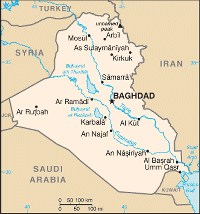

Duty To Warn
 |
 |
Author's Note: There is a policy in the U.S. intelligence community called "duty to warn." This means that if, in the course of your duties, you acquire information indicating a threat to virtually any person or organization, you have a duty to warn that individual or group of the threat. At times, this can be at cross purposes with the mission, but "duty to warn" takes precedence when loss of life is a probability.
Northern Iraq, 1995. I was serving with a CIA/Iraq Operations Group team conducting covert operations under the DBACHILLES program - the program to forment the overthrow of the regime of Saddam Husayn. We are dividing our time between the Kurdish Democratic Party (KDP) under Maísud Barzani and the Patriotic Union of Kurdistan (PUK) under Jalal Talabani.
In the middle of our tour, we get a cable from Langley advising us of a "duty to warn" obligation. The message is fairly clear - go to a Kurdish village in the area, locate an AMCIT (American citizen) so-and-so (letís call him Doug) and advise him that his life is in danger and that he should leave. (Of note was that the source of the information was what we all did for a living at one time or another.)
Some background: Doug is a "do-gooder" - the term we affectionately applied to the non-governmental organizations (NGO) working in northern Iraq. They were invaluable to rebuilding the infrastructure in the area, and we mostly got along fine. Most were doing civil projects, although a few were merely fronts for religious proselytizing. Doug was one of these. In addition to developing clean water drinking systems, Doug was passing out Bibles.
This was not lost on our competing covert operations teams in the area - most notably those of the Iranian Islamic Revolutionary Guard Corps (IRGC). To combat Dougís operation, the IRGC instituted a "Bible buy-back" program, paying the Kurds five dollars for each Bible they turned in. You can see how this soon became a growth industry for the Kurds. Get a Bible from Doug, sell it to the IRGC, get another Bible fro Doug, sell it to the IRGC, etc.
The IRGC soon tired of the game. I am not sure whether the local IRGC team (that I had other dealings with) came up with the idea or it came from Tehran, the decision was simply to kill Doug. Although not our style, it does have a certain elegance about it.
So, I get the tasking to warn Doug under the "duty to warn" policy. I gather up a few of our Kurdish guard force and another American to go to the village and pass the warning on to Doug. I can imagine his confusion. We roll into town, something like a cross between the Rat Patrol and Pancho Villa, Toyota pickups with mounted 12.7mmís, Alanis Morrisette blaring on the CD player - you get the picture.
I knocked on the door (I asked the locals, "Wayn al-Amrikan?" [Where's the American?]) and a gringo answers. I ask if he is Doug so-and-so. He says he is, but looking at our obviously loaded-for-bear entourage, asks who we are.
I reply, "Weíre from the State Department."
He looks at us, AK-47ís and Browning High-Powers all over the place.
I quietly said, "Just work with us here, Doug."
"What exactly do you want?" he asks. Obviously he was not a fan of the CIA mucking around in "his" area.
I explain, "We have information that the Iranians, who believe you are proselytizing Christianity, are planning to kill you. We are advising you to leave Iraq for your own safety and that of your family (he had actually brought his Dutch wife and 10-year old son with him)."
Incredulously, he asked me, "Do you have anything more specific, more concrete than the fact they plan to kill me?"
I was a bit taken aback - "The IRGC is going to kill you - Doug so-and-so. How much more specific do we have to be?"
After a few days and a bomb blast, he finally left. I have often wondered if I have the courage of my convictions or faith to face that kind of danger. He obviously was a believer.